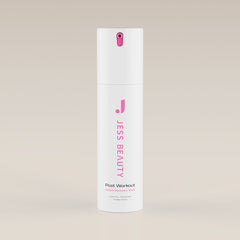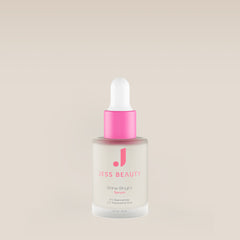There is no doubt that we are talking about one of the most famous ingredients in skin care.
You may have heard amazing things about hyaluronic acid in skin care, you may have heard a different and not so good opinion.
Even if it was your mother, grandmother, aunt, best friend or favorite influencer who told you about hyaluronic acid. Before applying it into your skin, the most important thing is to do your own research. And we are here for it.

First we need to understand: what is hyaluronic acid?
Hyaluronic acid is a sugar molecule that is naturally present in the body, especially in the skin. Its main function is to retain moisture, keeping the skin hydrated, firm, and elastic.
Over time and within sun exposure, our natural production of HA decreases, this can cause wrinkles and fine lines. It’s not so hard to deal with, all we need to do is eat healthy, include lots of vitamin c and zinc, hydrate and use products with hyaluronic acid in our skin care routine.
In a few moments, we will give you examples of those products, but first a fact about the power of hyaluronic acid: one molecule of Hyaluronic acid is capable of holding up to 1000 times its weight in water, making it a super hydrator.
Benefits of hyaluronic acid
The list of benefits of hyaluronic acid in skincare is long. We are going to mention the most important here.
When applied topically, Hyaluronic Acid works as a humectant, drawing moisture from the environment into the skin, improving hydration levels and imparting a plump, youthful appearance. HA has been also shown to support collagen production, which helps maintain skin elasticity and firmness, reducing the appearance of fine lines and wrinkles over time.
Now let's talk about it: does hyaluronic acid stain the skin?
One of the persistent concerns surrounding hyaluronic acid is whether it can cause skin staining. The short answer is no, hyaluronic acid does not stain the skin. In its pure form, it is colorless, odorless, and non-staining.
However, certain skincare formulations that contain hyaluronic acid may include other ingredients that could potentially cause staining.
It's essential to read the ingredient list carefully to minimize the risk of unwanted side effects.
In Jess Beauty, we ensure that each formula is assembled with the utmost care, utilizing natural ingredients and considering all skin types, while avoiding agents that may cause irritation.
Pros and Cons of Hyaluronic Acid on Skin
While hyaluronic acid is generally well-tolerated by most skin types, there are pros and cons to consider before incorporating it into your skincare routine.
Pros:
-
Amazing hydration: hyaluronic acid is a powerful humectant that attracts and retains water, providing intense hydration to the skin.
-
Anti-aging properties: HA stimulates the production of collagen and this helps to diminish the appearance of wrinkles and fine lines.
-
Improves elasticity: collagen is a key protein that provides elasticity to the skin, so another benefit of promoting collagen synthesis, is a firmer and more toned skin.
-
Powerful inflammatory: if you have sensitive skin or for some reason is irritated right now, this is your lifeguard. Hyaluronic acid will reduce redness and inflammation, achieving an even tone. You may want to read this.
-
Suitable for all skin types: Whether you have dry, oily, sensitive, or combination skin, hyaluronic acid can benefit you. It always gives you this soft, tense and youth effect.
If you want to start to incorporate hyaluronic acid to your routine, check out our Post Workout Gel Mask and Shine Bright Serum.
You can also double the results and go for this bundle!
Cons:
- Potential for dryness: In rare cases, hyaluronic acid may draw moisture from the deeper layers of the skin if not paired with an occlusive agent, leading to dryness.
- Need for complementary products: to maximize the benefits of hyaluronic acid, it's essential to use moisturizers or serums containing occlusive ingredients to seal in moisture and prevent dehydration. Here is where you need to be careful! HA will not irritate your skin, but other ingredients not suitable for you might do it.
Remember to consult your dermatologist, skin doctor or cosmetologist before using a new product. They are the ones that deeply understand the behavior of your skin, they can warn you about ingredients and give you professional advice.

Which type of skin must or must-not use hyaluronic acid?
We said it before, hyaluronic acid is safe for all skin types, here is how you can take the maximum benefit from it according to your skin type:
(If you are not sure about you skin type read this article and then come back here)
Dry skin: Hyaluronic acid is amazing for dry skin types, as it replenishes moisture and restores hydration levels, leaving the skin soft and supple.
Oily skin: Contrary to popular belief, oily skin can also benefit from hyaluronic acid. Its lightweight texture won't clog pores or exacerbate oiliness, making it suitable for oily and acne-prone skin.
Sensitive skin: Individuals with sensitive skin should opt for HA products with minimal additives and fragrances to reduce the risk of irritation.
Mix skin: Hyaluronic acid is well-suited for combination skin, as it hydrates dry areas without making oily zones feel greasy.
If you come this far, you know it: hyaluronic acid is great for you. And despite the rumors, hyaluronic acid does not stain. However, it's essential to choose high-quality products considering your skin type.
Read the ingredients carefully. Pay close attention when you add a new product to your skin care routine.
#JessBeautyTip: Keep our Beauty Bible always in hand!
This is the perfect moment to start a new routine and get a healthy, young and clear skin. Your journey starts in Jess Beauty.









